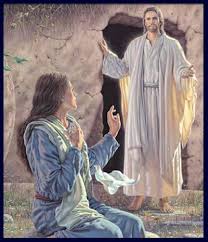Liturgical Readings for : Tuesday, 2nd April, 2024

Easter Tuesday
Jesus points out the new changed relationship he has with Mary Magdalene and us.
He returns to the Father to fulfil what he was sent to do.
FIRST READING
A reading from the Book of Acts of the Apostles 2:36-41
You must repent, and every one of you must be baptised in the name of Jesus Christ.

On the day of Pentecost, Peter spoke to the Jews:
‘The whole House of Israel can be certain that God has made this Jesus whom you crucified both Lord and Christ.’
Hearing this, they were cut to the heart and said to Peter and the apostles, ‘What must we do, brothers?‘ ‘
You must repent,‘ Peter answered ‘and every one of you must be baptised in the name of Jesus Christ for the forgiveness of your sins, and you will receive the gift of the Holy Spirit. The promise that was made is for you and your children, and for all those who are far away, for all those whom the Lord our God will call to himself.’
He spoke to them for a long time using many arguments, and he urged them,
‘Save yourselves from this perverse generation’. They were convinced by his arguments, and they accepted what he said and were baptised.
That very day about three thousand were added to their number.
The Word of the Lord. Thanks be to God
Responsorial Psalm Ps 32
Response The Lord fills the earth with his love.
Or Alleluia, alleluia, alleluia
1. The word of the Lord is faithful and all his works to be trusted.
The Lord loves justice and right and fills the earth with his love. Response
2. The Lord looks on those who revere him, on those who hope in his love,
to rescue their souls from death, to keep them alive in famine. Response
3. Our soul is waiting for the Lord. The Lord is our help and our shield.
May your love be upon us, O Lord, as we place all our hope in you. Response
Gospel Acclamation Ps 117: 24
Alleluia, Alleluia!
This day was made by the Lord; we rejoice and are glad.
Alleluia!
GOSPEL
The Lord be with you. And with your spirit
A reading from the holy Gospel according to John 20:11-18 Glory to you, O Lord
I have seen the Lord and he has spoken to me.

Mary stayed outside near the tomb, weeping. Then, still weeping, she stooped to look inside, and saw two angels in white sitting where the body of Jesus had been, one at the head, the other at the feet. They said, ‘Woman, why are you weeping?’
‘They have taken my Lord away,‘ she replied ‘and I don’t know where they have put him.’
As she said this she turned round and saw Jesus standing there, though she did not recognise him.
Jesus said, ‘Woman, why are you weeping? Who are you looking for?’
Supposing him to be the gardener, she said,
‘Sir, if you have taken him away, tell me where you have put him, and I will go and remove him’.
Jesus said, ‘Mary!’
She knew him then and said to him in Hebrew, ‘Rabbuni!’ – which means Master.
Jesus said to her,
‘Do not cling to me, because I have not yet ascended to the Father.
But go and find the brothers, and tell them: I am ascending to my Father and your Father, to my God and your God.’
So Mary of Magdala went and told the disciples that she had seen the Lord and that he had said these things to her.
The Gospel of the Lord. Praise to you, Lord Jesus Christ.
**********************************
Gospel Reflection Easter Tuesday John 20:11-18
I have often been struck by those words of the risen Jesus to Mary Magdalene in today’s gospel reading, ‘I am ascending to my Father and your Father, to my God and your God’. The God of Jesus is also our God, the Father of Jesus is also our Father. Because of Easter, we have come to share in Jesus’ own relationship with God. The risen Jesus gives us the gift of the Holy Spirit and that Spirit draws us into a sharing in Jesus’ relationship with God. Writing to churches of Galatia, Paul expresses this conviction in his own way, ‘God has sent the Spirit of his Son into our hearts crying, “Abba! Father!”’ The Spirit of the risen Lord within us moves us, inspires us, to address God in the same intimate way that Jesus did. In a sense, because of the presence of the Holy Spirit in our lives, the risen Lord prays his own prayer to God in us. Perhaps we don’t often think of the Lord as praying to God within us. Yet, that is the depth of the Lord’s communion with us that Easter makes possible.
When Jesus says to Mary Magdalene in the gospel reading, ‘Do not cling to me’, he was saying that it was not necessary for her to cling to him as if she was in danger of losing him. Through the Holy Spirit, he would come to her and be in a deeper relationship with her that he has ever been, his God becoming her God, his Father becoming her Father. This was the message that she was to go and proclaim to the other disciples, to all of us. She becomes the first and primary preacher of the gospel. This is the Easter gospel that continues to be proclaimed to us through her. The risen Lord is always in a deeply personal relationship with us, even in those times when we feel we have drifted from him. He doesn’t drift from us. Because of Easter, we can all make our own what Paul says elsewhere in his letter to the Galatians, ‘It is no longer I who live, but it is Christ who lives in me’ (Gal 2:20).
__________________________________
The Scripture Readings are taken from The Jerusalem Bible, published 1966 by Darton, Longman and Todd Ltd












